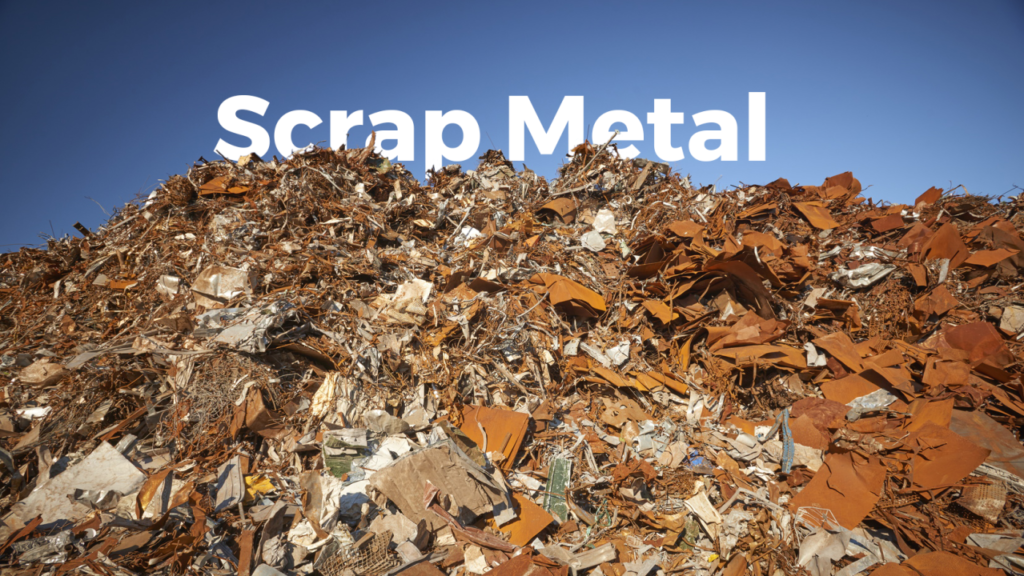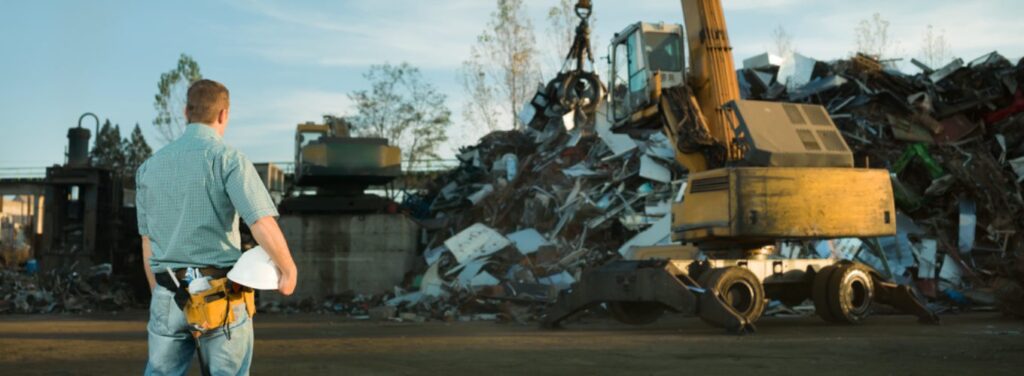Why Do Scrap Yards Pay In Cash Scrap yards often pay in cash for a variety of practical and economic reasons. This practice simplifies transactions by avoiding the complexities and fees associated with bank payments or electronic transfers. Cash payments also offer immediate liquidity for both the seller and the scrap yard, facilitating quicker and more straightforward transactions. For scrap yards, paying in cash can help streamline operations, reduce administrative overhead, and enhance confidentiality in dealing with their suppliers. Why Do Scrap Yards Pay In Cash

Additionally, cash transactions can be advantageous for sellers who may prefer the immediacy and privacy of cash over other forms of payment. However, this practice can also raise concerns about regulatory compliance and the potential for illegal activities, prompting some regions to impose stricter rules on cash transactions in the scrap metal industry. Why Do Scrap Yards Pay In Cash
The Mechanics of Scrap Yard Transactions :
The mechanics of scrap yard transactions involve a multifaceted process centered around the collection, sorting, processing, and resale of scrap materials. Initially, scrap yards acquire various types of scrap, including metals, electronics, and other recyclable materials, from diverse sources such as industrial waste, construction sites, and individual sellers. The transaction typically begins with an assessment where the scrap yard evaluates the quantity and quality of the material. Pricing is influenced by factors like market demand, material purity, and current commodity prices. Once a price is agreed upon, the transaction proceeds with the physical exchange, where materials are delivered to the scrap yard, weighed, and documented.
The scrap is then sorted into different categories—ferrous and non-ferrous metals, for example—and processed to remove contaminants and prepare it for resale. This processing can involve shredding, melting, or other methods depending on the material. Processed scrap is then sold to smelting plants or manufacturers who use it as raw material in their production processes. Throughout, scrap yards must adhere to regulations and environmental standards to manage waste responsibly and minimize pollution. Additionally, they often employ technology and data systems to track inventory, manage transactions, and optimize operations, ensuring efficiency and compliance in this essential component of the recycling industry.
Scrap yard transactions encompass a detailed and regulated process that begins with the sourcing of scrap materials from various contributors, including individual sellers, businesses, and industrial operations. Sellers bring their scrap materials to the yard, where an initial inspection and sorting occur. The scrap yard staff evaluates the materials based on type, weight, and quality, using specialized equipment like scales and analytical tools to determine their value. Pricing negotiations follow, influenced by the current market rates for different scrap commodities, which can fluctuate based on global supply and demand dynamics. Once a price is agreed upon, the transaction is formalized, often involving paperwork that includes weight tickets and transaction records.
The materials are then processed to prepare them for resale. This processing phase can involve several steps: shredding large items into manageable pieces, sorting materials into specific categories, and removing any non-metallic contaminants or impurities. For metals, this might include separating ferrous metals from non-ferrous metals and further refining them to meet industry standards. The processed scrap is then baled or compacted for easier handling and transportation. Why Do Scrap Yards Pay In Cash
Advantages of Cash Payments for Scrap Yards :

Cash payments offer several distinct advantages for scrap yards, enhancing both operational efficiency and financial management. First and foremost, cash transactions provide immediate liquidity, enabling scrap yards to quickly access funds without the delays associated with bank processes or electronic payment systems. This immediacy helps maintain a steady cash flow, which is crucial for day-to-day operations, such as purchasing new scrap or paying for processing costs. Recruiting Accelerator Cost
Additionally, cash payments reduce transaction fees and processing costs often associated with credit card transactions or bank transfers, which can be significant over time. This cost-effectiveness allows scrap yards to allocate resources more efficiently and potentially offer better prices to sellers. Moreover, cash transactions simplify record-keeping and financial reconciliation, as they involve straightforward, tangible exchanges without the need for electronic tracking systems. However, it’s important to note that while cash payments offer these benefits, they must be managed carefully to comply with legal and regulatory requirements, including anti-money laundering laws and proper documentation to ensure transparency and accountability.
Benefits of Cash Payments for Sellers :
Cash payments offer several compelling benefits for sellers, making them an attractive option in many transactions. One of the primary advantages is immediate liquidity; sellers receive their payment instantly, avoiding delays associated with checks or electronic transfers that can take time to process. This immediate access to funds can be particularly beneficial for individuals or businesses needing quick cash for ongoing expenses or investments. Additionally, cash transactions eliminate the risk of payment reversals or chargebacks, providing a guaranteed and straightforward exchange without the uncertainties of bounced checks or disputed electronic payments.
Cash also simplifies the transaction process by bypassing potential bank fees or transaction costs, allowing sellers to retain the full amount of the agreed-upon payment. Furthermore, cash transactions offer privacy and can be conducted discreetly, avoiding the need for detailed financial records or digital trails that electronic payments entail. Overall, these benefits make cash payments a practical choice for many sellers, particularly those seeking quick, reliable, and cost-effective transactions. Why Do Scrap Yards Pay In Cash
Potential Drawbacks and Risks :
Despite their advantages, cash payments come with potential drawbacks and risks that can impact both sellers and businesses. One significant drawback is the lack of security associated with handling large amounts of cash. Cash transactions are susceptible to theft or loss, and without proper safeguards, such as secure storage and transport procedures, the risk of financial loss increases. Additionally, cash payments can pose challenges in terms of tracking and documentation, making it harder to maintain accurate financial records and comply with tax regulations.
This lack of documentation can lead to difficulties in auditing and verifying transactions, potentially causing issues with regulatory compliance. For businesses, managing cash can also create logistical complexities, such as the need for frequent deposits to avoid holding large sums on-site, which can be both inconvenient and risky. Furthermore, cash payments are less convenient for larger transactions where electronic methods might be more practical. Overall, while cash offers immediate liquidity and simplicity, its associated risks require careful management to ensure security and proper financial oversight. Why Do Scrap Yards Pay In Cash
Regional and Legal Perspectives :

Regional and legal perspectives on cash payments in scrap yards vary significantly across different jurisdictions, reflecting a complex interplay between local regulations and broader financial practices. In many regions, legal frameworks mandate specific reporting and documentation requirements for cash transactions to combat money laundering and tax evasion. For instance, some jurisdictions impose thresholds above which cash transactions must be reported to financial authorities, ensuring transparency and reducing the risk of illicit activities. In addition, scrap yards operating in these regions are often required to implement stringent record-keeping practices and adhere to anti-money laundering regulations,
which may involve detailed reporting and verification of cash transactions. Regionally, there can also be variations in how strictly these regulations are enforced, with some areas having more rigorous compliance measures than others. Furthermore, cultural and economic factors influence the preference for cash payments, with some regions favoring cash transactions due to lower banking penetration or a preference for anonymity. Overall, navigating these regional and legal perspectives requires scrap yards to stay informed about local laws and adjust their practices accordingly to ensure compliance and mitigate risks associated with cash transactions. Why Do Scrap Yards Pay In Cash
Alternatives to Cash Payments :
Alternatives to cash payments offer a range of options that can enhance convenience, security, and efficiency for transactions in scrap yards and other industries. One prominent alternative is electronic payments, including bank transfers, credit and debit card transactions, and digital wallets, which provide immediate and secure ways to transfer funds without the need for physical cash. These methods reduce the risk of theft and loss associated with cash handling and often come with built-in fraud protection and transaction tracking features.
Another option is electronic funds transfers (EFTs), which allow for direct transfers between bank accounts and can be particularly useful for larger transactions or regular payments. Additionally, mobile payment systems and online payment platforms offer flexible and accessible payment solutions, enabling transactions from various devices and locations. For scrap yards, adopting these alternatives can streamline operations by simplifying accounting processes and reducing the administrative burden of handling cash. While these methods may involve transaction fees, they often provide a more secure and efficient way to manage payments, aligning with modern business practices and regulatory requirements. Why Do Scrap Yards Pay In Cash
Best Practices for Scrap Yards :
Best practices for scrap yards encompass a range of operational, environmental, and safety strategies designed to optimize efficiency, ensure regulatory compliance, and promote sustainability. Key practices include implementing robust sorting and processing protocols to maximize material recovery and value, such as using advanced machinery and technology for accurate sorting and efficient recycling. Proper record-keeping and documentation are essential for managing inventory, tracking transactions, and adhering to legal requirements, including anti-money laundering and environmental regulations.
Scrap yards should also prioritize safety by adopting comprehensive training programs for employees, enforcing stringent safety measures, and maintaining a clean, organized work environment to prevent accidents and injuries. Environmental stewardship is crucial, involving proper handling and disposal of hazardous materials, minimizing waste, and implementing recycling practices to reduce the ecological footprint. Additionally, maintaining transparent and fair pricing practices helps build trust with sellers and fosters positive business relationships. By integrating these best practices, scrap yards can enhance operational efficiency, uphold regulatory standards, and contribute to the sustainability of the recycling industry. Why Do Scrap Yards Pay In Cash
Conclusion :

In conclusion, the effective management of scrap yards involves navigating a complex landscape of operational, financial, and regulatory considerations to achieve both efficiency and sustainability. Cash payments, while offering immediate liquidity and simplicity, come with risks such as security concerns and challenges in documentation. Alternatives like electronic payments provide enhanced security and convenience but may involve additional costs. Regional and legal perspectives play a crucial role in shaping how scrap yards handle transactions,
ensuring compliance with local regulations and anti-money laundering laws. Best practices, including robust sorting processes, stringent safety measures, and environmental stewardship, are essential for optimizing operations and maintaining industry standards. By balancing these elements and adopting a holistic approach, scrap yards can enhance their operational effectiveness, ensure regulatory compliance, and contribute positively to the recycling industry’s goals of resource recovery and sustainability. Why Do Scrap Yards Pay In Cash
What do scrap yards pay most for?
While copper is the highest paying scrap metal, there are other base metals that are worth your time to have recycled. Brass and aluminum are two scrap metals that people often discard.
Which scrap is most profitable?
Brass, copper, and aluminium are the most valuable scrap metal items.
What brings the most money in scrap?
The most profitable scrap metals are typically precious metals like gold, silver, and platinum. However, non-ferrous metals like copper, brass, and aluminum can also bring in a decent profit.
Do scrap men pay you?
Scrap metal dealerships offer money in exchange for metal parts. With a little ingenuity and drive, you too can make a hefty profit from collecting and selling scrap metal.
Is scrapping a hobby?
Collecting scrap metal for resale, also called scrapping, is a hobby you could start as soon as today.

Pingback: Side Hustles For Physical Therapists